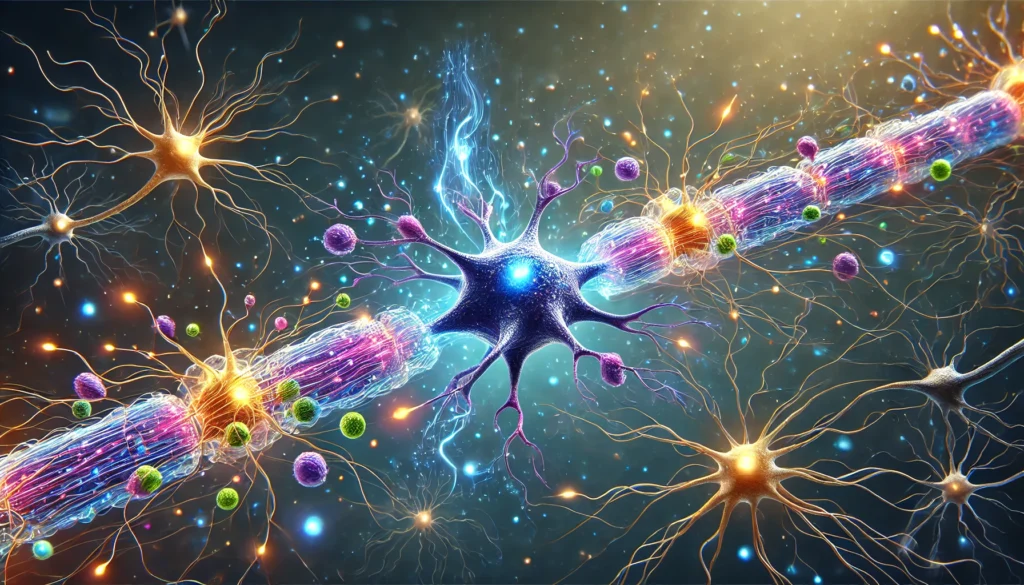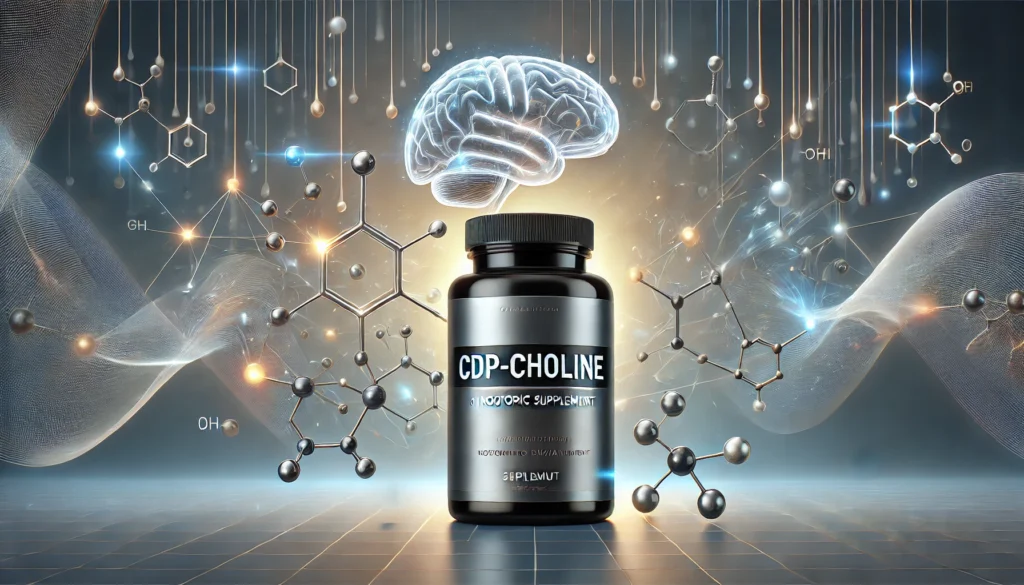Citicoline, also known as cytidine diphosphate-choline (CDP-Choline), is a naturally occurring substance that has attracted much interest in the field of nootropics due to its purported advantages over cognitive performance, focus, and alertness. In order to help those interested in using CDP-Choline responsibly, this article seeks to provide an in-depth examination of the chemistry, mechanism of action, health advantages, ideal dosage, potential side effects, and substance interactions of this nootropic supplement.
You May Also Like:
American Ivy: Benefits, Dosage, Side Effects, Drug Interactions, And Other Important Information
CDP-Choline: Benefits, Dosage, Side Effects, Drug Interactions, And Other Important Information is an original (NootropicsPlanet) article.
Nature of CDP-Choline
A naturally occurring substance called CDP-choline, called citicoline, is crucial in creating phosphatidylcholine, a vital component of cell membranes. It is made in the human body endogenously from choline and cytidine and can also be acquired through dietary sources such as organ meats, fish, and whole grains. By increasing phosphatidylcholine production in neuronal membranes and acting as a precursor for the neurotransmitter acetylcholine, CDP-Choline has been demonstrated to support cognitive function, alertness, and focus as a nootropic supplement.
Health Benefits of CDP-Choline
Studies on CDP-Choline have shown that it can enhance cognitive function in various populations, including the elderly, healthy people, and those with cognitive impairments.
- Improving cognitive performance in healthy adults: Studies have demonstrated that CDP-Choline supplementation can enhance adults’ executive, memory, and attentional functions. These advantages might be significant for people with demanding cognitive workloads, such as professionals or students.
- Reducing age-related cognitive decline: CDP-Choline has been found to reduce the negative effects of aging on cognitive function in older persons. Studies have shown that senior people who use CDP-Choline supplements perform better in terms of memory, attention, and executive function.
- Promoting cognitive recovery in brain damage and neurodegenerative conditions: CDP-Choline has been researched as a possible treatment for stroke, traumatic brain injury, and neurodegenerative conditions like Alzheimer’s and Parkinson’s disease. After CDP-Choline administration, studies have shown improvements in cognitive performance and decreased symptoms in these populations. Even though these findings are encouraging, more investigation is necessary to understand the therapeutic potential of CDP-Choline in these circumstances thoroughly.
Chemistry of CDP-Choline
Phospholipids found in cell membranes, particularly phosphatidylcholine, are biosynthesized using CDP-Choline as an intermediary. It is made up of a diphosphate bridge connecting cytidine and choline. CDP-Choline can be acquired through dietary sources or produced endogenously in the human body from choline and cytidine. Fish, some whole grains, and organ meats are exogenous sources of CDP-Choline.
After ingestion, CDP-Choline is hydrolyzed in the liver and intestines to create choline and cytidine, which are subsequently absorbed into the bloodstream. Choline and cytidine remix inside the brain cells to generate CDP-Choline, crossing the blood-brain barrier. This procedure demonstrates the body’s use of CDP-effective choline and its potential as a nootropic supplement.
Physiological Mechanism of Action
The main way CDP-Choline exerts its nootropic effects is by augmenting phosphatidylcholine production in neuronal membranes. Phosphatidylcholine is a vital part of cell membranes and crucial to their structural stability, fluidity, and functionality. Enhanced neural transmission and, thus, higher cognitive performance may result from increased phosphatidylcholine production.
Moreover, CDP-Choline is a precursor for the neurotransmitter acetylcholine, which is involved in several cognitive processes such as memory, attention, and learning. Supplementing with CDP-Choline can improve cognitive function by increasing the availability of choline, which in turn can increase acetylcholine production and release.
CDP-Choline has also demonstrated neuroprotective properties, perhaps by regulating neuroinflammation and apoptosis. According to studies, CDP-Choline can limit the activation of microglial cells, reduce the generation of pro-inflammatory cytokines, and prevent apoptosis. Particularly in times of stress or injury, these processes may help maintain neuronal integrity and function.

Optimal Dosage of CDP-Choline
The ideal CDP-Choline dosage may change depending on the individual’s age, cognitive needs, and general health status. Most research looking at the nootropic effects of CDP-Choline has employed daily dosages between 250 and 2,000 mg, frequently divided into two doses. Generally speaking, a daily dose of 500 to 1,000 mg seems safe and beneficial in generating cognitive benefits. Before beginning CDP-Choline supplementation, speaking with a medical expert to identify the best dosage and ensure it won’t conflict with any existing medical issues or drugs is crucial.
Side Effects of CDP-Choline
There have been minimal recorded adverse effects for CDP-Choline, which is usually considered safe and well-tolerated. Headache, dizziness, sleeplessness, and gastrointestinal disorders (such as nausea and diarrhea), among others, are the mildest and most temporary adverse effects. These signs and symptoms frequently depend on the dose and disappear independently. Rarely, people could encounter more severe side effects, including hypotension, tachycardia, or allergic responses. It is critical to stop using CDP-Choline supplements and speak with a doctor immediately if any of these symptoms appear.
Potential Substance Interactions with CDP-Choline
The possibility of harmful interactions between CDP-Choline and other substances is relatively minimal, although there are a few to be cautious of:
- Anticholinergic drugs: CDP-capacity Choline’s ability to boost acetylcholine synthesis may lessen the efficacy of anticholinergic medications, which treat various illnesses, including Parkinson’s disease, gastrointestinal problems, and an overactive bladder. Anticholinergic medicines and CDP-Choline usage should be regularly supervised by a medical expert.
- Cholinesterase inhibitors: These drugs are frequently prescribed for Alzheimer’s disease . They increase the availability of acetylcholine by blocking the enzyme that breaks it down. Cholinesterase inhibitors and CDP-Choline may elevate acetylcholine levels too much, increasing the risk of adverse effects like bradycardia and muscle weakness.
- Stimulants: CDP-Choline’s ability to improve focus and alertness may amplify the effects of stimulants like caffeine or amphetamines. This combination could result in anxiety, elevated blood pressure, and an accelerated heart rate. While taking CDP-Choline with stimulants, it is best to exercise caution and keep a close eye out for any adverse side effects.
Best Responsible Uses of CDP-Choline
The following guidelines should be taken into account by users of CDP-Choline as a nootropic supplement to ensure the most responsible usage of the supplement:
- Speak with a medical expert: Before beginning CDP-Choline supplementation, it’s essential to speak with a medical expert to determine your needs and any possible hazards. A healthcare practitioner can also determine the best dosage and look for potential drug or medical condition interactions.
- Begin with a low dosage: It is recommended to start CDP-Choline supplementation with a lower dosage (for example, 250 mg per day) and then progressively increase the dose as necessary to gauge individual tolerance and effectiveness. This strategy can reduce potential adverse effects and determine the ideal dosage for cognitive advantages.
- Keep an eye out for side effects: Those using CDP-Choline should watch for adverse effects that may manifest. If side symptoms develop, it might be essential to cut back on the dosage or stop taking the supplement. When experiencing serious side effects, get medical help right away.
- Combine with a healthy lifestyle: To get the most out of CDP-cognitive choline’s advantages, people should prioritize a healthy lifestyle that includes regular physical activity, a balanced diet, enough sleep, and stress management. These variables may work in concert with cognitive function and general well-being.
- Regularly assess effectiveness: It should be evaluated periodically to ascertain whether CDP-Choline supplementation fulfills specific cognitive needs and objectives. Suppose the intended results are not obtained, the dosage may need to be changed. In that case, alternative approaches may need to be discussed with a healthcare provider, or CDP-Choline may need to be taken in conjunction with other nootropic substances.
By adhering to these recommendations, individuals can ensure the best responsible usage of CDP-Choline to improve cognitive function and advance long-term brain health.
CPD-Choline:
Conclusion
CDP-choline is a compound with notable potential for supporting cognitive and neurological health. A growing body of research supports its benefits, highlighting its effectiveness in several key areas: cognitive function, neuroprotection, stroke recovery, mood and mental health, and vision improvement.
While CDP-Choline shows significant promise, it is essential to consider that most benefits are based on clinical research, and individual responses can vary. Its safety profile is generally well-established, but consulting with a healthcare professional before starting supplementation is advisable, particularly for those with preexisting conditions or those taking other medications. CDP-Choline stands out as a valuable nootropic supplement. Its comprehensive support for brain health makes it a compelling choice for individuals seeking to maintain or improve cognitive and neurological function.

References:
- The role of citicoline in cognitive impairment: pharmacological characteristics, possible advantages, and doubts for an old drug with new perspectives. Retrieved from: https://www.ncbi.nlm.nih.gov/pmc/articles/PMC4562749/
- Neuroprotective Properties of Citicoline: Facts, Doubts and Unresolved Issues. Retrieved from: https://www.ncbi.nlm.nih.gov/pmc/articles/PMC3933742/
- CDP-choline: pharmacological and clinical review. Retrieved from: https://pubmed.ncbi.nlm.nih.gov/8709678/
- Citicoline improves memory performance in elderly subjects. Retrieved from: https://pubmed.ncbi.nlm.nih.gov/9203170/
Important Note: The information contained in this article is for general informational purposes only, and should not be construed as health or medical advice, nor is it intended to diagnose, prevent, treat, or cure any disease or health condition. Before embarking on any diet, fitness regimen, or program of nutritional supplementation, it is advisable to consult your healthcare professional in order to determine its safety and probable efficacy in terms of your individual state of health.
Regarding Nutritional Supplements Or Other Non-Prescription Health Products: If any nutritional supplements or other non-prescription health products are mentioned in the foregoing article, any claims or statements made about them have not been evaluated by the U.S. Food and Drug Administration, and such nutritional supplements or other health products are not intended to diagnose, treat, cure, or prevent any disease.


